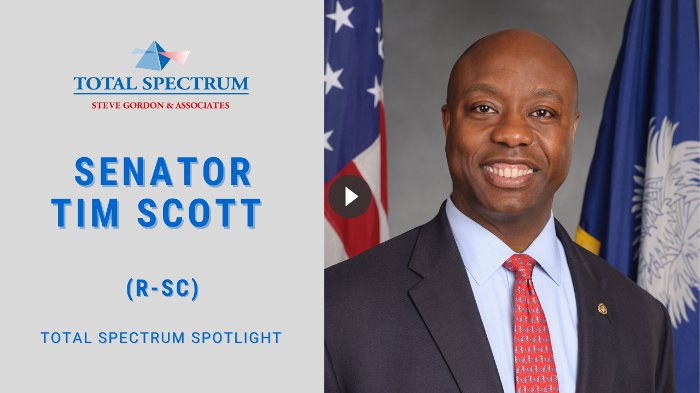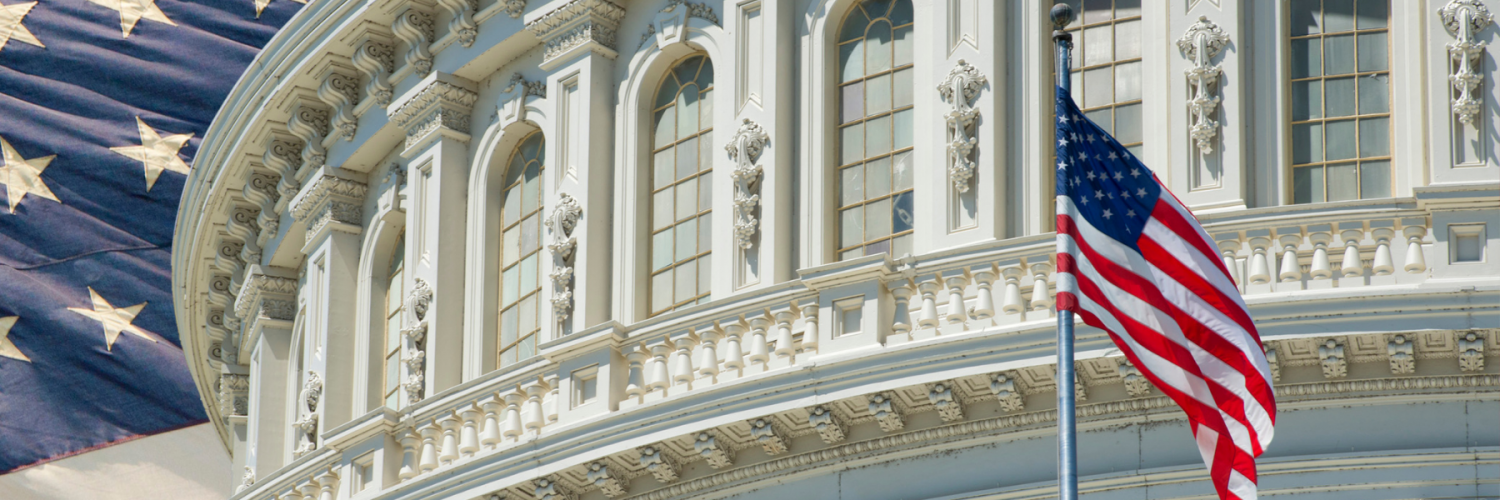Latest news from Washington, D.C. produced by Total Spectrum/SGA exclusively for members of the Arizona Chamber of Commerce & Industry
More Info: Michael DiMaria | Partner and Vice President of Business Development | 602-717-3891 | [email protected]

Thanks so much for your interest in Washington, D.C., and thanks again for reading This Week in Washington.
Patrick Robertson leads off this edition with his Washington Whispers column, which focuses on the research and development tax credit. We have also prepared an Infograph which provides details on the R&D tax credit. Al Jackson brings us up to date on defense issues and defense appropriations.
We recently shared a Total Spectrum Spotlight interview between Congressman Erik Paulsen and Senator Tim Scott (R-SC), and we’ve included it in this edition as well. Watch this short but significant interview of one Senator who is on everybody’s list of rising stars in Washington.
Senator Todd Young (R-IN) is one of the chief authors of USICA, the United States Innovation and Competition Act that is being conferenced between the House and the Senate. Congressman Erik Paulsen recently caught up with Senator Young and this interview will be in an upcoming Total Spectrum Spotlight.
Have a wonderful July 4th holiday. We’ll return on July 13th with the next issue of This Week.
Stay well.

Total Spectrum Managing Director
Total Spectrum Spotlight
Senator Tim Scott (R-SC) is a rising star in Washington, and that’s acknowledged by people on both sides of the aisle. His intellect, communication skills, and uncommon common sense have made him a quiet leader on all the committees on which he serves – Finance; Banking, Housing, and Urban Affairs; Health, Education, Labor, and Pensions; and Small Business – and on the Floor of the Senate.
He often talks about his goal to positively impact lives. His signature achievement was the creation of Opportunity Zones, which became part of the 2017 tax reform legislation. Opportunity Zones have brought billions of dollars in private investment into distressed areas throughout our country, which in turn has brought jobs, hope, and new opportunities for millions of Americans.
Senator Scott is a former small business owner, having operated an insurance agency in Charleston. He is in his second term in the Senate, and previously served on the Charleston Country Council, the South Carolina House of Representatives, and the U.S. House of Representatives before being sworn into the U.S. Senate in 2013.
Congressman Erik Paulsen sat down with Senator Scott to talk about the viability of the American Dream through access to education and the Senator’s commitment to Opportunity Zones as a vehicle for positive change. Senator Scott also talked about the headwinds facing small businesses, how funding reform is inextricably intertwined with criminal justice reform, and why we must address supply chain issues through infrastructure investments.
Watch this relatively short interview, and you’ll see why Senator Tim Scott is a rising star.

Washington Whispers
By Patrick Robertson, Total Spectrum Strategic Consultant
Although the narrative in Washington is often one of paralysis and inaction, I try to show where Congress is moving legislation, like the China competitiveness bill and this week a modest compromise on legislation surrounding guns. But to truly understand Washington, it is also important to understand why pieces of legislation do not move and why compromise is so elusive.
This week’s edition of This Week in Washington details the recent changes to the Research and Development Tax Credit and how the 2017 move to weaken that incentive could be undone. You may wish to reference the related Infograph on Business R&D Deductions for additional detail. I recently spoke on a panel at a state Bar Association tax section and the entire conversation was about the R&D credit.
For many years, the R&D credit was a temporary provision in the tax code, in place for somewhere between one and five years; it would then be extended by Congress in a package called Tax Extenders along with many other temporary provisions. Businesses successfully argued that this short-term extension of this provision would not incentivize the kind of activity Congress wanted because there was not enough certainty that the credit would continue to be in place.
In 2015, the R&D Tax Credit was made permanent by Congress, and it seemed the long winding road of extenders had come to an end. The Protecting Americans from Tax Hikes (PATH) Act also included significant changes to tax benefits for lower income Americans including the Earned Income Tax Credit and the Child Tax Credit. At the end of the day, this bill was an excellent example of Obama-era dealmaking because some provisions in the tax code were expanded for everyone.
However, when Congressional Republicans and President Trump reformed the tax code in 2017, they looked to significantly lower the corporate tax rate and help keep the cost of the proposal to the Treasury within reasonable boundaries. While U.S. businesses generally agreed that lowering the corporate rate to between 25-28% would make them more competitive, the final bill brought the U.S. corporate rate down to 21%.
To help offset the ‘costs’ of getting to the new lower corporate rate, other tax provisions like the R&D Credit were changed once again in a sort of phase out by the end of 2022. Effective January 1, 2022, companies will have to stretch their R&D tax credits over several years rather than taking them in one year. This, going forward, reduces the value of the credit to the companies.
As you can imagine, the business community is nearly unanimous in its desire to change the law and take the credits all in one year. Many Congressional Democrats and Republicans support, in isolation, making the change as well. But this is far from a slam dunk because of the politics.
In the American Rescue Plan, passed early last year, Democrats significantly expanded the anti-poverty Child Tax Credit. However that expansion expired at the end of 2021, and Democrats have not been able to renew it. Republicans do not support an expansion as broad as the one Democrats secured.
Most Democrats, even those who support the R&D changes, are not willing to make corporate tax improvements without individual improvements and Republicans seem to be dug in on their opposition to the individual expansion Democrats want. Democrats also are not keen on fixing something Republicans did in a partisan 2017 tax bill that excluded Democrats.
As a result, we remain in a standstill on all tax provisions going into the heat of the summer. We will stay on top of this issue and many others heading into the fall and early winter when a deal is possible.
Defense Update
By Al Jackson, Total Spectrum Strategic Consultant
In their version of the National Defense Authorization (NDAA) bill, Senate Armed Services Committee members added $45 billion to the Fiscal Year (FY) 2023 budget request of the administration. The $847 billion top line represents an 8% increase over what was authorized in FY2022. The Senate NDAA bill includes a 4.6% pay raise for troops; offers language requiring all women to register for potential future military drafts; and increases funding for procurement of a host of combat aircraft, naval vessels, armored fighting vehicles and munitions. The House Armed Services Committee is expected to add $37 billion to the FY2023 budget request.
House Democrat Appropriators, in concert with the Biden Administration’s budget request, only provided a $32 billion increase over the FY2022 defense budget to the tune of $762 billion. By contrast, Republicans and some centrist Democrats desired a FY2023 budget raise of 3% – 5% above historic inflation rates. In the initial draft, the funding bill would provide $7.2 billion for 61 new F-35 fighters. The legislation also provides the full $1.7 billion the Air Force sought for its Next Generation Air Dominance program and cuts by one-quarter the number of F-15EX fighters the Air Force requested for FY2023. The legislation includes $1.9 billion to buy 18 F-15EX fighters next year, down from the 24 the Air Force sought at a price tag of $2.7 billion.
The Senate Armed Services Committee’s version of NDAA includes language to divest 21 A-10s at Fort Wayne Air National Guard Base in Indiana. The Air Force has repeatedly asked Congress for the authority to divest from the A-10 program. However, last year’s FY2022 NDAA bill did not allow the Air Force to cut 42 A-10 aircraft from service, due in large part to resistance from the Arizona delegation, as 35 of those aircraft based in Arizona would have gone away.
After Hurricane Michael devastated Tyndall Air Force Base in 2018, the installation was revitalized when the service announced plans to base three F-35 Joint Strike Fighter squadrons there. The challenge has been finding qualified maintainers for the F-35. The Air Force had originally planned to use maintainers from the A-10 Warthog program, as their goal was to retire those aircraft. Instead, as previously mentioned, the Arizona delegation prohibited the Air Force from retiring those aircraft via the FY2022 NDAA legislation. When the Air Force was prohibited from reducing its A-10 inventory in FY2021 and FY2022 from 281 to 218 aircraft, the service was required to keep about 920 people tied to the Warthog instead of being able to redirect those personnel to other billets. Thirty-five of those aircraft were slated to come from Davis-Monthan Air Force Base in Arizona. It’s unclear exactly how Tyndall AFB will find maintainers for its new F-35 aircraft but it is not the only base affected – Hill AFB (Utah), Eielson AFB (Alaska), as well as training squadrons at Luke AFB (Arizona) and Eglin AFB (Florida) are impacted.
Congress hoped to free up Air Force maintainers for the F-35 by adding $185 million for F-35 sustainment and $70 million for A-10 sustainment in the FY2022 appropriations bill. However the issue remains, thereby putting the A-10s future in doubt per the Air Force’s desire to divest the aircraft. This year’s Senate version of NDAA begins that process.
Congressional Calendar
All times ET
Tuesday, June 21
- 1 p.m. House Jan. 6 Select Committee hearing on the investigation into the insurrection.
- 2 p.m. House Rules Committee business meeting to prepare four measures for floor consideration, including a bill that would establish the Advanced Research Projects Agency-Health and the Senate-passed Honoring our PACT Act.
- 4 p.m. House Appropriations Interior-Environment Subcommittee markup of the panel’s draft fiscal 2023 appropriations bill.
- 5:30 p.m. House Appropriations Energy-Water Subcommittee markup of the panel’s draft fiscal 2023 appropriations bill. 2359 Rayburn.
Wednesday, June 22
- 9:30 a.m. Senate Appropriations Commerce Justice Science Subcommittee hearing on the fiscal 2023 budget for the U.S. Trade Representative. USTR Ambassador Katherine Tai testifies.
- 9:30 a.m. Senate Agriculture Committee markup of two bills, one that would establish the Office of the Special Investigator for Competition Matters within the Agriculture Department and another that would create a cattle contract library.
- 9:30 a.m. Senate Banking Committee hearing on the semiannual monetary policy report to Congress. Federal Reserve Board Chair Jerome Powell testifies.
- 10 a.m. House Agriculture Committee hearing on dairy provisions in the 2022 farm bill.
- 10 a.m. House Foreign Affairs Western Hemisphere, Security and Trade Subcommittee hearing on causes on migration from Central America through private investment.
- 10 a.m. House Judiciary Committee hearing on oversight of the Justice Department’s National Security Division.
- 10 a.m. House Oversight Committee hearing on the National Football League’s handling of workplace misconduct at the Washington Commanders. NFL Commissioner Roger Goodall testifies, among others.
- 10 a.m. House Science Energy Subcommittee hearing on the nature of matter, energy, space and time.
- 10 a.m. House Transportation Economic Development and Emergency Management Subcommittee hearing on the risks to the General Services Administration in the Capital Investment Program.
- 10 a.m. Senate Environment and Public Works Committee hearing on implementing the Toxic Substances Control Act.
- 10 a.m. Senate HELP Committee hearing on practices to get students and schools back on track.
- 10 a.m. Senate Judiciary Committee hearing on pending nominations.
- 10 a.m. House Appropriations Committee markup of the chamber’s draft fiscal 2023 Defense and Legislative Branch appropriations bills.
- 10 a.m. House Armed Services Committee markup of the fiscal 2023 National Defense Authorization Act.
- 10 a.m. House Financial Services Committee markup of 11 bills, including one that aims to establish fair and transparent marketing practices of overdraft coverage programs at financial institutions.
- 10 a.m. Senate Commerce Committee markup of five bills, including one that aims to ensure equal treatment of athletes, as well as four nominations and additional Coast Guard promotions.
- 10:30 a.m. House Energy and Commerce Energy Subcommittee hearing on six energy bills, including one that aims to secure critical energy resources.
- Noon. House Economic Disparity and Fairness in Growth Select Committee hearing on inclusive growth and efficiency in the tax code.
- 2 p.m. House Foreign Affairs Middle East, North Africa and Terrorism Subcommittee hearing on the Biden administration’s policy objectives in the Middle East and North Africa.
- 2:30 p.m. House Administration Elections Subcommittee hearing on how disinformation damages American democracy.
- 2:30 p.m. House Homeland Security Cybersecurity and Infrastructure Protection Subcommittee hearing on mitigating security risks of potential emerging technologies.
- 2:30 p.m. Senate Homeland Security Committee hearing on the Federal Emergency Management Agency’s priorities and disaster preparedness. FEMA Administrator Deanne Criswell testifies.
- 2:30 p.m. Senate Indian Affairs Committee hearing on the Interior Department’s Federal Indian Boarding School Initiative Investigative Report and a bill that would establish the Truth and Healing Commission on Indian Boarding School Policies.
- 2:30 p.m. Senate Judiciary Intellectual Property Subcommittee hearing on examining proposals to the Patent Trial and Appeal Board.
- 2:45 p.m. Senate Foreign Relations Committee hearing on examining the proposed accession of Sweden and Finland into NATO.
- 4 p.m. House Foreign Affairs Committee hearing on The Biden Administration’s Policy Objectives in the Middle East and North Africa.
- 4:15 p.m. Senate Appropriations Legislative Branch Subcommittee hearingon the fiscal 2023 budget for Library of Congress and Government Accountability Office.
- 5 p.m. House Appropriations State-Foreign Operations Subcommittee markup of the panel’s draft fiscal 2023 appropriations bill.
- 7 p.m. House Appropriations Commerce-Justice-Science Subcommittee markup of the panel’s draft fiscal 2023 appropriations bill.
Thursday, June 23
- 9 a.m. House Foreign Affairs Committee closed hearing on Somalia.
- 9 a.m. Senate Judiciary Committee business meeting.
- 9 a.m. House Congress Modernization Select Committee hearing on modernizing the innovation cycle.
- 9:15 a.m. Senate Foreign Relations Committee hearing on four International Monetary Fund, United Nations, Department of State and ambassador nominations.
- 10 a.m. House Coronavirus Select Committee hearing on the Covid-19 response with former President Donald Trump’s Covid-19 Response Coordinator Deborah Birx.
- 10 a.m. House Financial Services Committee hearing on monetary policy and the state of the economy.
- 10 a.m. House Judiciary Courts, Intellectual Property and the Internet Subcommittee hearing on the patent trial and appeal board after 10 years of innovation and small business.
- 10 a.m. House Science Research and Technology Subcommittee hearing on federal programs for measuring greenhouse gas sources and sinks.
- 10 a.m. House Small Business Committee hearing to review the Small Business Administration’s Office of Government Contracting and Business Development.
- 10 a.m. Senate Aging Committee hearing on strengthening support for grandfamilies during the pandemic.
- 10 a.m. Senate Banking Committee hearing on reauthorization of the National Flood Program.
- 10 a.m. House Appropriations Committee markup of the chamber’s draft fiscal 2023 Agriculture-FDA and Military Construction-VA appropriations bills.
- 10:15 a.m. House Education and Labor Civil Rights and Human Services Subcommittee hearing on policies and priorities of the USDA’s Food and Nutrition Service.
- 10:15 a.m. Senate Homeland Security Committee hearing on building trust in government through customer experience.
- 10:30 a.m. House Agriculture Commodity Exchanges, Energy and Credit Subcommittee hearing on the future of digital asset regulation.
- 11 a.m. Senate Foreign Relations Committee business meeting to consider four nominations and three resolutions, including one that would call on the Secretary of State to designate the Russia as a state sponsor of terrorism.
- 1 p.m. House Jan. 6 Select Committee hearing on the investigation into the insurrection.
- 2 p.m. House Foreign Affairs Subcommittee on Africa, Global Health and Global Human Rights classified briefing on Ethiopia.
- 4 p.m. House Appropriations Transportation-HUD Subcommittee markup of the panel’s draft fiscal 2023 appropriations bill.
- 5:30 p.m. House Appropriations Labor-HHS-Education Subcommittee markup of the panel’s draft fiscal 2023 appropriations bill.
Friday, June 24
- 9 a.m. House Appropriations Committee markup of the chamber’s draft fiscal 2023 Homeland Security and Financial Services spending bills.
- 9 a.m. House Climate Crisis Select Committee hearing on cutting methane pollution.
| What you need to know about eased and extended telehealth rules |

| Federal Reserve raises interest rates to fight inflation |

| What you need to know about business R&D deductions |

| What you need to know about SEC ownership disclosure rules |

| GOP senators announce support for gun safety deal |

| Covid-19 test requirements for travelers lifted as hospitalizations slowly level out |

| Where extreme heat hits hardest |

| Click image for full report |
















Add comment